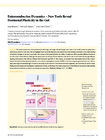
Open access
Date
2020-10Type
- Journal Article
Abstract
The recent intersection of enteroendocrine cell biology with single-cell technologies and novel in vitro model systems has generated a tremendous amount of new data. Here we highlight these recent developments and explore how these findings contribute to the understanding of endocrine lineages in the gut. In particular, the concept of hormonal plasticity, the ability of endocrine cells to produce different hormones over the course of their lifetime, challenges the classic notion of cell types. Enteroendocrine cells travel in the course of their life through different signaling environments that directly influence their hormonal repertoire. In this context, we examine how enteroendocrine cell fate is determined and modulated by signaling molecules such as bone morphogenetic proteins (BMPs) or location along the gastrointestinal tract. We analyze advantages and disadvantages of novel in vitro tools, adult stem cell or iPS-derived intestinal organoids, that have been crucial for recent findings on enteroendocrine development and plasticity. Finally, we illuminate the future perspectives of the field and discuss how understanding enteroendocrine plasticity can lead to new therapeutic approaches. Show more
Permanent link
https://doi.org/10.3929/ethz-b-000425394Publication status
publishedExternal links
Journal / series
Endocrine ReviewsVolume
Pages / Article No.
Publisher
Oxford University PressSubject
enteroendocrine; intestine; plasticity; differentiation; model systems; organoidOrganisational unit
09712 - Gehart, Helmuth / Gehart, Helmuth
More
Show all metadata


